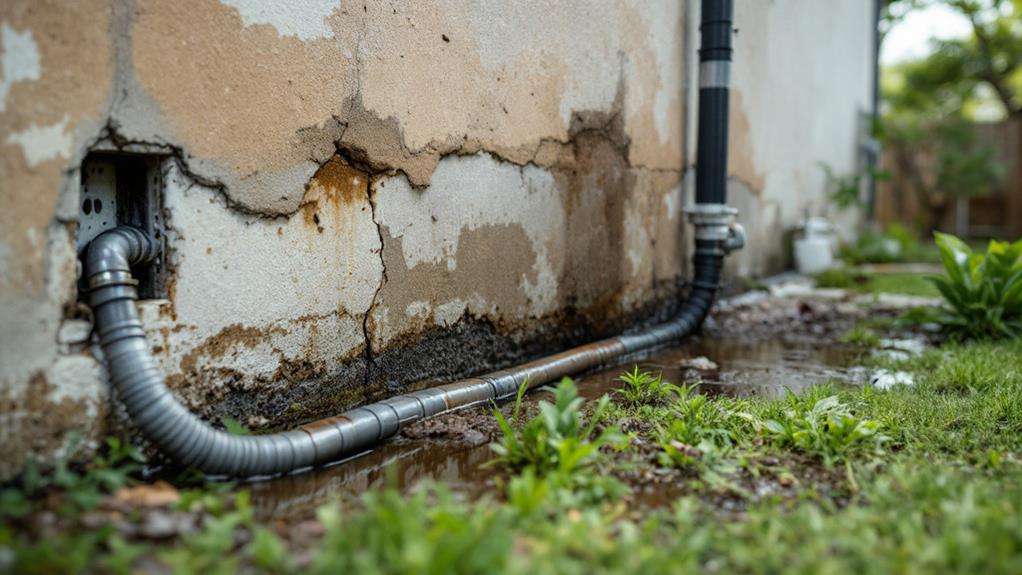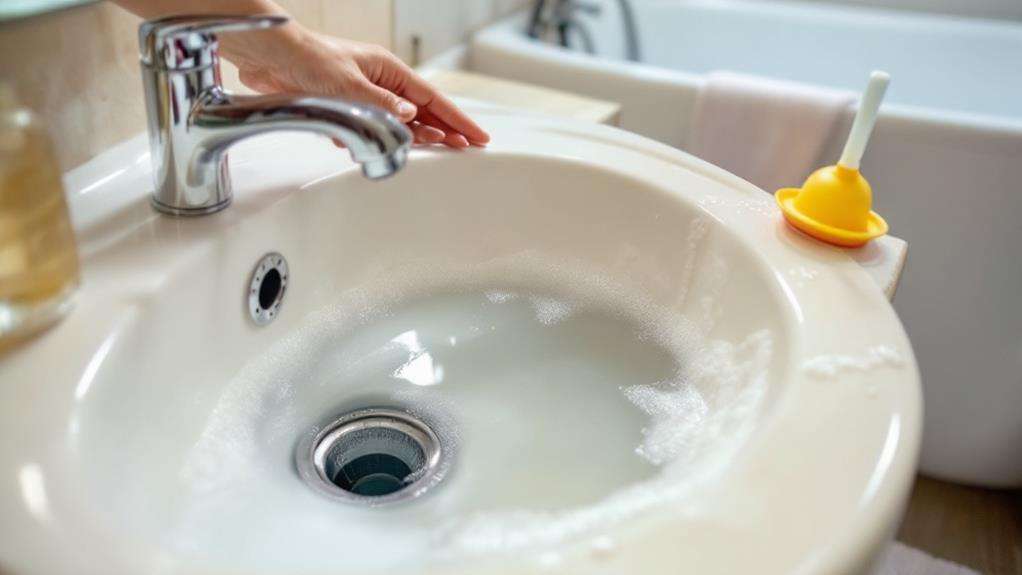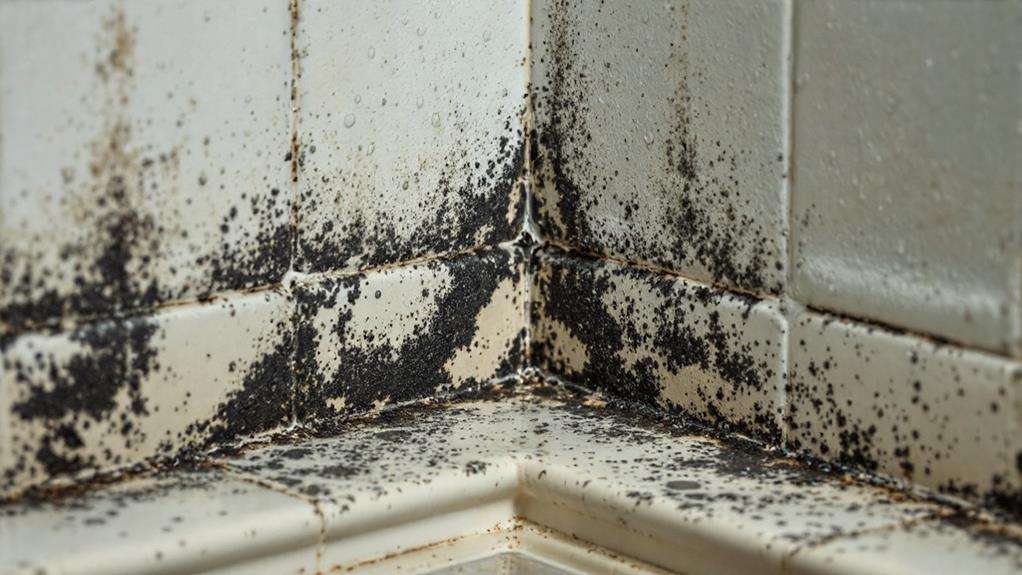Top 5 Signs Your Home's Drainage System Needs Repair

Your home's drainage system may need repair if you notice these five signs: standing water in your yard after rain, foul odors emanating from drains, slow-draining sinks and tubs, foundation cracks or shifting, and unexplained mold growth. These issues can lead to serious problems like soil erosion, foundation damage, and health hazards. Standing water can create mosquito breeding grounds, while foul odors and slow drains might indicate blockages or improper venting. Foundation issues and mold growth often stem from water intrusion or leaks. Recognizing these signs early can help you address drainage problems before they escalate into costly repairs.
Standing Water in the Yard
You've probably noticed puddles lingering in your yard long after it rains. This standing water is a clear sign that your home's drainage system needs attention. When water fails to drain properly, it can lead to a host of problems, including soil erosion, foundation damage, and mosquito breeding grounds.
Several factors can contribute to this issue. Low soil absorption is a common culprit, especially in areas with clay-heavy soil that doesn't allow water to percolate efficiently. Improper grading is another frequent cause, where the land doesn't slope away from your home, trapping water near the foundation.
To address standing water, you'll need to assess your yard's specific conditions. Consider having a professional evaluate your soil composition and the overall grading of your property. They may recommend solutions such as installing French drains, creating swales, or regrading your lawn to improve water flow.
Don't ignore this problem, as it can worsen over time. Addressing standing water promptly will protect your home's foundation, prevent landscaping damage, and maintain a healthier outdoor environment. If you're consistently seeing puddles in your yard, it's time to take action and repair your drainage system.
Foul Odors From Drains
From your kitchen sink to your bathroom shower, unpleasant smells wafting from drains are more than just a nuisance—they're a warning sign. These foul odors often indicate a problem within your home's drainage system that requires immediate attention. When you notice persistent, unpleasant smells coming from your drains, it's time to investigate further.
These odors are typically caused by a buildup of bacteria, organic matter, or sewer gases trapped in your pipes. You might also hear gurgling sounds accompanying the smell, which suggests air is trapped in the system. This combination of odors and noises points to potential blockages or improper venting in your plumbing.
Pay attention to frequent clogs in multiple drains throughout your home, as they often coincide with foul smells. These clogs can trap debris and create an ideal environment for odor-causing bacteria to thrive. If you've tried common remedies like drain cleaners or plunging without success, it's likely that the issue lies deeper in your drainage system. In such cases, it's best to consult a professional plumber to diagnose and repair the underlying problem before it escalates into a more serious and costly issue.
Slow-Draining Sinks and Tubs

A telltale sign of drainage system issues is the slow emptying of sinks and tubs. If you notice water taking longer than usual to drain, it's time to investigate. This problem often stems from clogged drain pipes, which can result from accumulated hair, soap scum, or mineral deposits. As these obstructions build up, they restrict water flow, leading to inefficient drainage.
Don't ignore slow-draining fixtures, as they can escalate into more severe problems. Over time, the blockage may worsen, potentially causing complete pipe blockages or even backups. You might also notice gurgling sounds as water struggles to pass through the pipes, indicating air trapped in the system due to the obstruction.
To address slow drains, start with simple solutions like using a plunger or a drain snake. If these methods don't work, it's best to call a professional plumber. They can use specialized tools to clear stubborn clogs and inspect your pipes for any underlying issues. Regular maintenance, such as using drain covers and periodically flushing pipes with hot water, can help prevent future clogs and maintain efficient water flow in your home's drainage system.
Foundation Cracks or Shifting
In addition to slow drains, foundation cracks or shifting can be a serious indicator of drainage system problems. When water doesn't drain properly around your home's foundation, it can lead to soil erosion and instability. This erosion weakens the ground supporting your house, potentially causing the foundation to crack or shift.
You might notice signs of foundation issues inside your home, such as uneven floors, doors that don't close properly, or visible cracks in walls or ceilings. Outside, look for cracks in the foundation itself or gaps between the foundation and the ground. These issues often worsen over time if left unaddressed.
Poor drainage can also cause water to pool around your foundation, leading to hydrostatic pressure. This pressure can force water through small cracks, causing further damage and potentially flooding your basement or crawl space. If you spot any of these signs, it's essential to have your drainage system inspected promptly.
A professional can assess the situation and recommend solutions like installing or repairing gutters, grading the land away from your home, or adding French drains to redirect water. Addressing drainage issues early can prevent costly foundation repairs down the line.
Unexplained Mold Growth

The third telltale sign of drainage system issues is unexplained mold growth in your home. If you've noticed persistent mold spots on walls, ceilings, or corners, especially in areas that aren't typically exposed to water, it's time to investigate your drainage system. Mold thrives in damp environments, and its presence often indicates excess moisture.
Pay attention to musty smells, as they're usually the first indicator of mold growth. These odors can be particularly noticeable in basements, crawl spaces, or areas near plumbing fixtures. If you detect a persistent earthy or musty scent, don't ignore it.
Inspect your walls for signs of dampness, such as discoloration, peeling paint, or a clammy feel. These symptoms suggest that water is seeping through your home's structure, possibly due to poor drainage around the foundation or leaky pipes.
